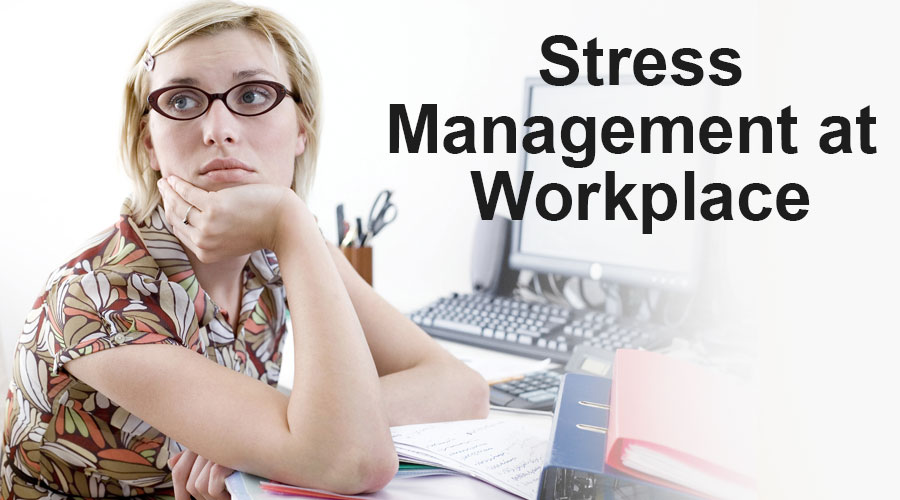
Overview of Stress Management at Workplace
The following article provides an outline for Stress Management at Workplace. The world has become very fast-paced on today’s date. Everything must be done fast. This has made life very stressful, both on the personal and professional front. On the personal front, one has to manage his/her family and relationships, and on the professional front, one must manage work, staff, and clients. Hence, striking a work-life balance has become very difficult. This leads to immense stress in an individual and affects his/her health. Stress is a state of emotional or physical conflict. It arises from any instance or incident that makes you feel frustrated and angry and leads to developing anxiety.
Stress is your body’s reaction to a challenge or demand. It drains you both physically and emotionally. Stress levels are generally high at the workplace and hence, need to be managed. Occupational stress develops when things do not turn out as they are expected to be. Occupational stress can increase when employees do not get full-fledged support from seniors and peers or feel as if they cannot get control over their work. In this topic, we are going to learn about Stress Management at the Workplace and different Ways to Handle Stress at Workplace.
Different Ways to Handle Stress at Work
There are various skills and methods to handle stress at work:
- Right, Start of Your Day: After struggling to feed kids and send them off to school, trying to beat the traffic on the road or at least avoid it, and drinking black coffee in order to have something healthy, people are as it is under a lot of stress by the time they reach office, and possibly get more stressed in the entire day at work. So starting off your day by being optimistic about everything your day includes, having the right kind of breakfast and planning the day efficiently then, you can conveniently handle stress at your workplace.
- Be Clear with Requirements: A major contributor to stress at the job is the vague requirements of the concerned job. If one has no idea about his/her job requirements and they are too flexible, one will end up getting more stressed than usual. If you doubt your work or whatever you are doing then, have a discussion with your boss and revamp strategies if needed. This will make both of you comfortable.
- Avoid Altercations at Work: Any kind of conflict affects an individual’s physical and mental health, and moreover, conflict among co-workers is obvious and unavoidable; it’s a good idea to avoid conflict at work as much as possible. One can ensure simple things like no gossiping, don’t express your personal opinions on sensitive subjects like politics and religion in public, try and avoid getting involved in a tempting and luring office humor. Try to avoid people with whom you cannot connect. If still, you get into any conflict, then handle the situation sensibly.
- Stick to Your Comfort Zone: Another astonishing contributor to stress at the workplace is physical discomfort. You may not feel stressed when you’re on a chair that does not suit you for a few minutes. But if you sit on that chair for long when you are at your workplace working day in and day out, you can develop back pain issues and be more vulnerable to stress for this one reason. Even small distractions can result in a bit of frustration. So, ensure that you work from a silent zone.
- Forget Multitasking: Multitasking was at one point hailed as the best way to get more work done in a day. Then people realized that their speed and accuracy (not to mention sanity) suffered by multitasking. There is a certain point why concentrating on numerous things simultaneously doesn’t work well for most people. Instead of multitasking, we can adopt a new strategy called ‘chunking’, dividing work into small chunks or workstations.
- Being a Perfectionist is a Stressor: Being an extraordinary worker can help inculcate a feel-good factor and perform well at work. But in pursuit of perfection, on the other hand, you can drive yourself and your colleagues’ nuts. In jobs that require pace and are target-driven, you may not be very successful at it. So, give your best and then congratulate yourself on having done your best as it is something wise. This will better off your performance at work and reduce stress.
- Listen to Music While Returning Home: Listening to music has its own benefits and can prove to be an effective stressbuster after long and tedious working hours at the office.
- Stay Organized: If you have been a disorganized person all throughout your life, staying organized can reduce work stress. Being organized will help you manage time very well, and you won’t have a hurry for anything in your entire day. In addition, being organized helps to make work efficient and keep clutter at bay.
- Walk at Lunch: The ill effects of a sedentary lifestyle are known to one and all. An easy and simple way to manage stress and fight out our lifestyle issues is by taking out some time for exercise or at least take a walk during the lunch break. This will definitely help you maintain your shape and prevent mood swings.
Recommended Articles
This has been a guide to Stress Management at Workplace. Here we discuss the different ways to handle stress in Workplace. You can also go through our other suggested articles to learn more –
